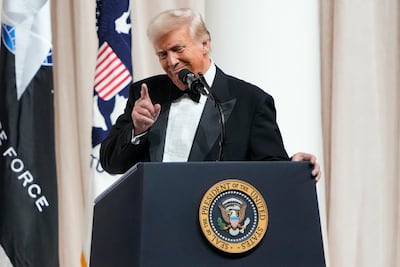The American stand-up comedian Dave Chappelle recently shared a wonderful analogy about what it's like to be a celebrity these days. He describes the experience as being akin to storming the beaches of Normandy on D-Day, bombs exploding and bullets flying as the battle unfolds around you, while being forced to wear a happy expression on your face the whole time.
His joke resonated because everywhere I look, I notice examples of leaders – those running governments and businesses – doing the same thing. They attempt to communicate a sense of control when they are obviously dealing with brutal technological, economic and climate-driven trends.
It will ultimately prove futile to maintain a forced smile in the public discourse while the running of a business or country is undermined by the various forces at play. No one is buying it anymore. The facade will not hold. It's like circling a giant drain. Eventually, you're going to drown.

Throughout history, leaders have, of course, always played to the gallery. However, in recent decades the proliferation of media and the closer proximity of bigger audiences as a result has raised the likely risk of failure. Since the 1990s, and the emergence of an era of political correctness that coincided with 24-hour news channels and then the rise of digital media platforms, the attempts to be seen to be PC have morphed into what some describe as culture wars. Regardless of the cause, issue or topic in question, we have grown weary of being pandered to.
US President Donald Trump hinted at this collective exhaustion when he mentioned a crisis of trust during his inauguration speech on Monday. That is partly why those leaders who've been the most effective at engaging with a broad group of people on both sides of the political divide have been from the companies, people and institutions that know exactly who they are and what they are about.

John Browne, chief executive of BP between 1995 and 2007 (the company’s golden period) calls this “purpose”. Being able to communicate what this purpose is consistently and directly to your audiences, customers and employees is what matters more than following a trend.
Mr Browne told Bloomberg in September that losing sight of purpose can result in the very backlash that is trying to be avoided.
“I come back to the question of purpose,” he said. “The purpose of a company is to create goods and services which are compatible with society, that actually make money for their shareholders. Companies are not in the business of just doing ESG. When it looks like the company is just doing ESG people react against it.”
Ironically, there is no better illustration right now of how to avoid such pitfalls – by both being able to evolve with the times successfully and knowing yourself and your audience – than the WWE, the professional wrestling organisation.
For much of wrestling’s modern history it had been the ultimate example of maintaining a facade. There was an unspoken pact where everyone involved knew that it wasn’t real competition but to shatter that illusion would have been considered an exercise in corporate self-immolation. The expectation being no one would want to watch it anymore.
However, as the WWE has grown and ridden through many challenges it has learnt it can be authentic without hurting its product. After signing a landmark 10-year distribution deal with Netflix, giving it unprecedented global reach, it marked the moment by broadcasting during its first live-streamed show a promotional video montage that burst the bubble irrevocably. Chief content officer Paul “Triple H” Levesque was straight-faced amid the controversy, highlighting that its audiences appreciated wrestling as an “art form”.
“The reaction seems like we did a good job with it. That was the intent: to capture the emotion and let people know we’re not hiding what we do. I saw a lot of chatter today from people saying, ‘Oh my God, they said heel and face and shoot and work in one promo.’ We’re not hiding what we do. That’s what we do," he said.
Mr Levesque’s response to the noise is refreshing and likely marks the start of a period of maturity in the business world. We will increasingly become familiar with it as more and more leaders recognise how far the landscape has shifted.
It may result in an end to what the British liberal philosopher John Stuart Mill, who wrote the seminal book On Liberty in the 19th century, called the risk of oppression by the tyranny of the majority and that has been a fixture in recent years.
He was a staunch defender, too, of freedom of speech, which so many people are currently claiming to be the custodians of, cynically covering the pursuit of their own self-interests. That is just another form of pandering in the end.
Perhaps the best lesson we can draw in 2025 from Mill – who championed the rights of the individual to strive for a life of originality – is that while originality will always be rejected by the mainstream, it is vital to nurture it for any hope of creating a more equitable world. When the fear of being ostracised just for what you bring to the world diminishes, there is more light and, as a result, fewer dark places from which chaos and havoc can be wrought.

